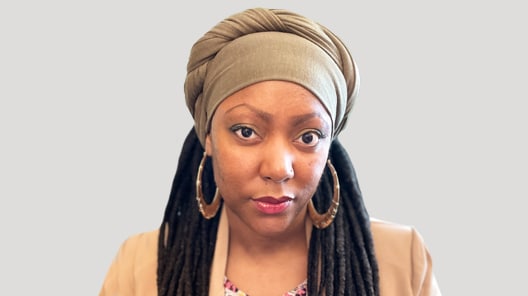Insights
Celebrating the influence of African Americans in the arts

At State Street, we strive to foster a more equitable society through key partnerships with nonprofits that focus on promoting economic opportunities in communities where we live and work. In honor of Black History Month, we spotlight Transformative Culture Project’s mission to create social and economic power for artists of color.
February 2024

Letia Larok
Executive Director,
Transformative Culture Project
Through her talent and love of music, Letia Larok is transforming and empowering her community.
“Although I love to entertain and make music, I always felt there was more that I could do,” she explains. “I knew music could open up doors for me to speak to my people and reach a larger audience.”
Letia heads the Boston-based nonprofit social enterprise Transformative Culture Project (TCP). As TCP’s executive director, she empowers young people to develop profitable careers in the arts, encourages them to use the arts as an outlet to tell their own stories, and opens doors for hundreds of aspiring local artists to showcase their talent. As a community leader, educator and hip-hop artist, she represents and promotes the spirit of this year’s Black History Month’s theme: African American Culture – Music, Dance, Art, Poetry and Innovations.
“Some people don't pay artists what they're worth or see art as a job that people pursue to feed their families,” says the Boston native.
Letia is working to change that attitude with the help of companies like State Street that support workforce development and education initiatives. Since 2012, we have partnered with TCP to help expand their youth development programs. In line with our 10 Actions to Address Racism and Inequality Initiative, we strive to advance racial equity through our partnerships, programs and priorities.
“We are proud to support TCP as they partner with local schools and universities to nurture and provide a positive outlet for disengaged young people to creatively express and uplift their lived experiences through art,” says Omaira Alicea-Ravelo, senior grants manager, State Street Foundation. “TCP lays the groundwork for young people to tap into their talents and develop self-determination, opening up opportunities for them to explore and pursue viable creative career pathways in art.”
Through TCP, Letia blends her artistry and activism to provide education in visual arts, poetry, videography, hip-hop and music production, while also cultivating profitable careers in creative fields. She produces artist showcases around Boston and helps some participants to release their own music — allowing them to keep 100 percent of the proceeds.
“That kind of support can be transformative for young artists, who often receive negative messages about their career prospects,” says Letia, who as a child fell in love with music. She went on to perform alongside music legends, released dozens of songs as a hip-hop artist and won national recognition for her skills.
“I think there's still a stigma when it comes to being an artist,” she says. “I know, for myself growing up, it wasn't really taken as a serious job. It was viewed as a hobby, and I feel that issue still exists.”
TCP hires local creatives, called teaching artists, to lead classes in Boston Public Schools, and after-school and summer programs. Letia, who became involved with TCP in 2015 as a teaching artist, says the organization is intentional about recruiting teachers who reflect and live in the communities they serve, ensuring instructors can relate to their students’ life experiences.
“Providing these opportunities in the arts for youth, especially Black and Brown youth, is very important — it empowers them to explore their creativity and express their identity, culture and experiences authentically,” she says.
Each year, TCP trains roughly 120 young people and, Letia says, it’s rewarding to see the confidence of each participant grow throughout the program. In addition to learning how to use art as an outlet to express themselves, students improve their communication, collaboration and problem-solving abilities — key skills that are valuable outside the art world. Many graduates of TCP programs have gone on to pursue art in college or have taken leadership roles within their communities.
“I've been the starving artist who had to decide how to keep a paycheck and my art,” Letia explains. “And I've been the youth who didn't have the resources that we now have today. I have personal experience dealing with some of the conflicts that artists experience, and now I’m trying to be a part of that solution.”
Fittingly, given the theme of this year’s Black History Month, Letia hopes to continue inspiring young people in Boston and beyond, and ensure they have the resources they need to thrive in the arts.
“If I could be known as someone who really had a passion for investing in their community, inspiring the next generation of young and adult creatives, I would be completely fulfilled,” she says.



